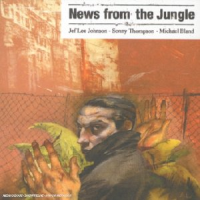Home » Jazz Articles » Genius Guide to Jazz » Genius Guide F.A.Q.
Genius Guide F.A.Q.
Everything You Ever Wanted to Know About Genius, But Were Afraid to Ask
A. As you know, Jeff won the title Genius by knocking out Albert Einstein at Madison Square Garden in April 1987. He has since defended the title 12 times, most recently against documentary filmmaker and freelance loudmouth Michael Moore. Jeff put Moore on the canvas twice in the second round and the pudgy malcontent failed to answer the bell for the third, preferring instead to sit in his corner and yell slogans. The bout was ruled a technical knockout by referee Thomas G. "Go-Go" Burish, President of Washington and Lee University. Jeff's record is 36-1, the one loss coming early in his career in a stunning upset by actor Jim Varney, that "Hey Vern" guy. Jeff is also licensed by the Virginia Department of Genius and Inland Fisheries, permit on file.
Q. What are his jazz credentials?
A. Besides being a member of the award-winning Alleghany High School jazz ensemble, he majored in music at Mars Hill College. He also attended Virginia Commonwealth University while Ellis Marsalis was in residence, thus fulfilling the Marsalis Involvement Clause required for membership in the jazz community (located off I-64, near the Cracker Barrel). He played jazz trombone (semi)professionally for a short while, before realizing that humorists got more leg than trombonists by an order of magnitude. Jeff is also a member of the Jazz Journalists Association, who obviously don't read their membership applications all that closely.
Q. Is that really him in the picture?
A. No, that is actor Jack Nance, and astute readers know that this picture is from the David Lynch cult classic Eraserhead. It is used by permission of Major League Baseball, who probably weren't quite sure what we were asking when they said "Yeah, go ahead." Jeff was home recuperating from a pulled hamstring (or hammed pullstring) on AAJ's picture day, and missed the make-up day because they were serving peach cobbler in the AAJ cafeteria that day and he just hates peaches.
Q. Why does he seem to have it in for Ken Burns?
A. Jeff's spirited rivalry with Ken "Give Me Two Weeks and I'll Give You A Movie It Takes At Least That Long to Watch" Burns is nothing personal, but rather, just another front in Jeff's overall battle with documentary filmmakers (see above). He feels that most documentary films nowadays are either redundant and unimaginative, or else shrill and self-serving. Also, they seem to contain a conspicuous lack of nude scenes by any of his favorite actresses (Thora Birch, Rachel Weisz, Dame Judi Dench).
Q. Where does he get off calling himself the Dean of American Jazz Humorists® ?
A. 1) He called "dibs." 2) Name another one.
Q. Is it true that he is from, and continues to reside in, the Blue Ridge Mountains of Virginia?
A. Yes.
Q. Isn?t that sort of odd? I mean, that's not known as a hotbed of jazz.
A. Not at all. The power of jazz has traditionally transcended all boundaries, and continues to do so even today as it reaches new and eager audiences all over the world. Assisted by the Internet, which connects the entire world together by common interests and not traditional geographical or cultural separations, it is now possible not only to spread jazz to even the most remote corners of the earth but to see exactly what every single female in the world between the ages of 18 and 35 looks like naked.
Q. What's this fixation with female nudity?
A. Jeff is a practicing, board-certified heterosexual male.
Q. I have several antique green glass Mason jars left to me by my grandmother. How can I determine their age and value?
A. You have obviously arrived at this page by mistake while looking for www.allaboutjars.com. Happens all the time. It doesn't help that jazz legend/home canning expert Sonny Rollins is the editor emeritus of their Jams and Jellies section.
Q. I am looking to start a jazz collection. Any suggestions?
A. Any serious jazz collection should contain: Louis Armstrong, Duke Ellington, Miles Davis, John Coltrane, Charlie Parker, Molasses, Hydrogenated Peanut Oil, Wheat Flour, Cane Sugar, Milk Powder, and Potassium Benzoate (to preserve freshness). No, wait. Apparently, I read right across my CD rack and onto a nearby package of Archway cookies. Forget the potassium benzoate. And those with peanut allergies, adjust your collection accordingly.
Q. Does Jeff Fitzgerald, Genius really drink as much as he claims?
A. Not currently, since he does abstain from alcohol during Lent. The rest of the year, however, Jeff is quite fond of all manner of spirits. Being a native Southerner and descended from a long line of prime elbow-bending stock, primarily Irish and German, even his saliva has an alcohol content of 3.2%. He is not an indiscriminate boozehound, though, despite his inexplicable love of Budweiser. He is the lone beer snob among the wine-loving majority of AAJ staffers, and his current beers of choice are bottle-conditioned Belgian ales. Jeff suggests La Trappe Quadrupel, Triple Karmeliet, and Ommegang (a Belgian-style ale brewed in Cooperstown, NY).
Q. What gives with Jeff's e-mail address ([email protected])?
A. Jeff, a passionate baseball fan and student of the Deadball Era of major league baseball, has long been involved with an effort to get both Shoeless Joe Jackson and Buck Weaver reinstated to baseball. As you may or may not know, those two men were banned from the game for life as part of the Black Sox Scandal of 1919, wherein eight members of the highly favored Chicago White Sox were accused of taking money from gamblers in exchange for throwing the World Series against the Cincinnati Reds. Though there is still considerable debate as to whether Jackson accepted the money, his play in the Series is unassailable. He batted .375, had a record 12 hits, hit the only homerun by either side, and played errorless ball. Weaver took no money and did nothing to throw the Series, but was banned for knowing about the scheme and not reporting it. Jackson, whose lifetime .356 average is third highest in major league history, clearly belongs in the Hall of Fame but cannot be elected until he is reinstated; and Weaver, a respected and well-liked player who was just coming into his own at third after a shaky start in the majors at shortstop, deserves to be delivered from ignominy even if it is purely ceremonial. Another bit of trivia about the name Black Sox: It had nothing, at first, to do with the scandal. The White Sox under tightwadded, dictatorial owner Charles Commisky were the worst paid and worst treated players in baseball, and were even charged by the club to launder their uniforms. When they refused to wash them, preferring instead to wear the dirty woolen garments over and over, they came to be known as the Black Sox. It could be argued that Commisky had as much to do with the scandal as any of the players involved in the conspiracy.
Q. What the hell does that have to do with jazz?
A. Hey, you asked.
Q. Was pioneering saxophonist Frankie Trambauer really a raccoon, or Coati, as claimed in various places throughout the Guide ?
A. Yes, he was.
Q. What proof do you have to back that up?
A. Jeff cites the memoirs of bandleader Jean Goldkette, who recalls seeing Trambauer insist on washing his food before eating it. "Once, at this really swank joint in Chicago, Frank conspicuously dunked a perfectly good Beef Wellington in his fingerbowl. It was then we all started to suspect something was up with him." Close friend Bix Beiderbecke often complained that he "couldn't keep Frank away from (his) trash cans." And let's not forget that Trambauer won the North American Procyonid Society's "Man" of the Year Award 12 years in a row (1924-36).
Q. When will the Genius Guide be published in a convenient book form?
A. Funny you should ask. The Genius Guide to Jazz should be published by AAJ Press in time for the holidays.
Q. What holidays? Easter? Arbor Day?
A. Thanksgiving and Christmas, at the latest.
Q. Will it just be a collection of the columns published first on the Website?
A. No. While it will contain some material from aaj.com, it will be composed mostly of original material.
Q. Wow, where can I get copies for myself and all my friends and loved ones?
A. It will be available right here on allaboutjazz.com, at our online retail partners and at select "bricks and mortar" retailers.
Q. Was this whole line of questioning in fact just a shameless plug for the upcoming Genius Guide book?
A. Yes, yes it was.
Till next month, kids, exit to your right and enjoy the rest of AAJ.
Tags
PREVIOUS / NEXT
Support All About Jazz
 All About Jazz has been a pillar of jazz since 1995, championing it as an art form and, more importantly, supporting the musicians who make it. Our enduring commitment has made "AAJ" one of the most culturally important websites of its kind, read by hundreds of thousands of fans, musicians and industry figures every month.
All About Jazz has been a pillar of jazz since 1995, championing it as an art form and, more importantly, supporting the musicians who make it. Our enduring commitment has made "AAJ" one of the most culturally important websites of its kind, read by hundreds of thousands of fans, musicians and industry figures every month.
























